GALLUP NEWS SERVICE
PRINCETON, NJ -- As the U.S. Senate debates the merits of a House-passed energy bill that is also backed by the Bush administration, a recent Gallup poll finds that Americans are more supportive of the measures being proposed by environmentalists and Democratic leaders in the Senate than the proposals contained in the House bill. Yet, at the same time, Americans say -- by a margin of 51% to 28% -- that they favor rather than oppose President Bush's plan to deal with the country's energy problems. The increase in support for Bush's plan over the past year, however, may be part of a larger rally effect for the president in the wake of the Sept. 11 terrorist attacks rather than a change in the way people think about energy more generally. Americans still opt for conservation of energy supplies over production of new ones as they did last year. And, also like last year, they opt for protecting the environment over developing U.S. energy supplies by a modest margin.
| Favor or Oppose President Bush's Plan to Deal With the Country's Current Energy Problems? |
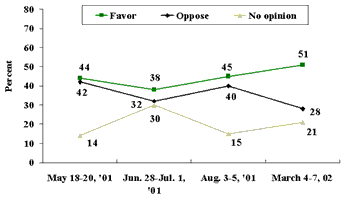 |
The House bill authorizes drilling for oil in the Arctic National Wildlife Refuge (ANWR), the issue that a recent article in the Los Angeles Times calls "the top priority of the Bush administration and the energy industry." The bill does not provide tougher fuel economy standards for cars and trucks, what that same article says is "the top goal for the environmental movement and most Democrats." In fact, the U.S. Senate voted on Wednesday not to add new standards to the bill. The poll finds that Americans oppose oil drilling in ANWR, by a margin of 56% to 40%, but support tougher emission standards on automobiles by 72% to 26%.
| Favor or Oppose Opening up the Arctic National Wildlife Refuge in Alaska for Oil Exploration? |
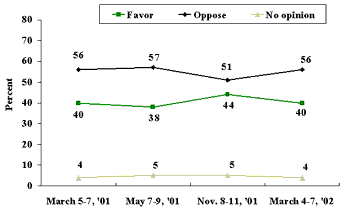 |
More generally, Americans say the United States should emphasize conservation of existing energy supplies more than production of new energy sources, by a 60% to 30% margin. These results are similar to those obtained last year at this time, though in a poll conducted in May of last year, support for conservation dipped to 47%.
| Possible Energy Solutions: Produce More or Conserve More? |
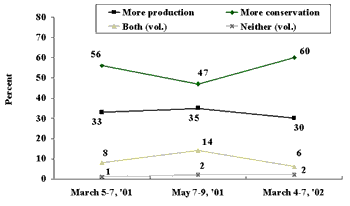 |
| (vol.) Volunteered response |
Americans also continue to say they would give priority to protection of the environment over development of U.S. energy supplies. In the current poll, the margin of support is 52% to 40%, compared with 52% to 36% last year.
| Which Should Be a Priority: Environmental Protection or Energy Development? |
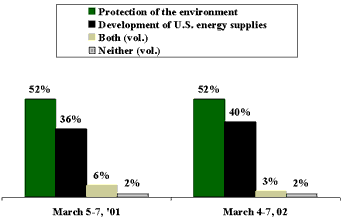 |
| (vol.) Volunteered response |
Although the Bush administration's policy appears to take the opposite tack, Americans still say that Bush is doing a good rather than poor job of improving the nation's energy policy, by 46% to 36%. Still, that margin in favor of Bush has narrowed over the past year -- a significant finding given the general increase in positive responses on most questions asked about the president since Sept. 11.
| Do You Think George W. Bush Is Doing a Good Job or a Poor Job in Improving the Nation's Energy Policy? |
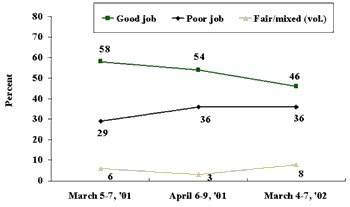 |
| (vol.) Volunteered response |
Among a list of proposals, Americans appear more supportive of mandating higher emission and pollution standards than of expanding oil production or the use of nuclear energy. In part, that may be due to the wording of the question, which asked respondents to evaluate "some specific environmental proposals." But in the case of the ANWR proposal, two other Gallup surveys have asked respondents to evaluate drilling for oil in that region of the country as part of efforts "to deal with the energy situation." The results in May of last year were quite similar to those found two months earlier, suggesting that people are focusing more on the specific proposals than on whether those proposals are to deal with either the energy or environmental situation.
As shown in the graph below, the public is fairly evenly divided on giving tax breaks to provide incentives for drilling for more oil and gas in the United States, and on expanding the use of nuclear energy. Meanwhile, there is greater opposition than support for drilling in ANWR and for restricting energy use among consumers. On the other hand, setting higher pollution standards in business and for cars, along with developing solar and wind power, are favored by at least seven in 10 Americans.
| Environmental Proposals: Favor or Oppose? |
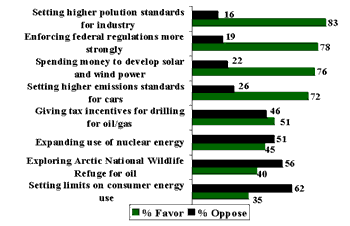 |
Energy Situation Seen as Less Serious This Year Than Last
Compared with last year, Americans today appear much more sanguine about the energy situation. Only 22% now say it is very serious, while 47% expressed that view last year. Similarly, today Americans are about evenly divided -- 48% to 49% -- over whether the United States is or is not likely to face a critical energy shortage in the next five years. Last year, 60% of Americans thought such a shortage was likely, while 36% did not.
| Is It Likely the United States Will Face a Critical Energy Shortage in the Next Five Years? |
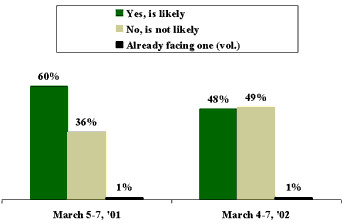 |
| (vol.) Volunteered response |
Survey Methods
Results are based on telephone interviews with 1,006 national adults, 18 years of age and older, conducted March 4-7, 2002. For results based on the total sample of national adults, one can say with 95% confidence that the margin of sampling error is +/- 3 percentage points.
In addition to sampling error, question wording and practical difficulties in conducting surveys can introduce error or bias into the findings of public opinion polls.
Based on what you have heard or read, do you favor or oppose President Bush's plan to deal with the country's current energy problems?
|
Favor |
Oppose |
No opinion |
|
|
2002 Mar 4-7 |
51% |
28 |
21 |
|
2001 Aug 3-5 |
45% |
40 |
15 |
|
2001 Jun 28-Jul 1 ^ |
38% |
32 |
30 |
|
2001 May 18-20 |
44% |
42 |
14 |
|
^ Preceded by question asking how closely following the news about President Bush's energy plan. |
|||
With which one of these statements about the environment and energy production do you most agree – [ROTATED: protection of the environment should be given priority, even at the risk of limiting the amount of energy supplies -- such as oil, gas and coal -- which the United States produces (or) development of U.S. energy supplies -- such as oil, gas and coal -- should be given priority, even if the environment suffers to some extent]?
|
|
Development of U.S. energy supplies |
|
other (vol.) |
|
|
|
2002 Mar 4-7 |
52% |
40 |
3 |
2 |
3 |
|
2001 Mar 5-7 |
52% |
36 |
6 |
2 |
4 |
|
(vol.) Volunteered response |
|||||
Do you think George W. Bush is doing a good job or a poor job
in:
B. Improving the nation's energy policy
|
Good job |
Poor job |
Fair/mixed (vol.) |
No opinion |
||
|
2002 Mar 4-7 |
46% |
36 |
8 |
10 |
|
|
2001 Apr 6-9 ^ |
54% |
36 |
3 |
7 |
|
|
2001 Mar 5-7 ^ |
58% |
29 |
6 |
7 |
|
|
^ |
Do you think George W. Bush will do a good job or a poor job in handling each of the following issues as president? How about – [RANDOM ORDER]? |
||||
|
(vol.) Volunteered response |
|||||
Next I am going to read some specific environmental proposals. For each one, please say whether you generally favor or oppose it. How about – [RANDOM ORDER]?
- Expanding use of nuclear energy
|
|
|
No |
|
|
2002 Mar 4-7 |
45% |
51 |
4 |
|
2001 Mar 5-7 |
44% |
51 |
5 |
B. Opening up the Arctic National Wildlife Refuge in Alaska for oil exploration
|
Favor |
Oppose |
No opinion |
||
|
2002 Mar 4-7 |
40% |
56 |
4 |
|
|
2001 Nov 8-11 ^ |
44% |
51 |
5 |
|
|
2001 May 7-9 ^ † |
38% |
57 |
5 |
|
|
2001 Mar 5-7 † |
40% |
56 |
4 |
|
|
^ |
Next, here are some things that can be done to deal with the energy situation. For each one, please say whether you generally favor or oppose it. How about -- [RANDOM ORDER]? |
|||
|
† |
WORDING: Opening up the Alaskan Arctic Wildlife Refuge for oil exploration. |
|||
C. Spending more government money on developing solar and wind power
|
|
|
No |
|
|
2002 Mar 4-7 |
76% |
22 |
2 |
|
2001 Mar 5-7 |
79% |
19 |
2 |
D. More strongly enforcing federal environmental regulations
|
|
|
No |
|
|
2002 Mar 4-7 |
78% |
19 |
3 |
|
2001 Mar 5-7 |
77% |
20 |
3 |
E. Giving tax breaks to provide incentives for drilling for more oil and gas in the U.S.
|
|
|
No |
|
|
2002 Mar 4-7 |
51% |
46 |
3 |
|
2001 Mar 5-7 |
53% |
43 |
4 |
F. Setting higher auto emissions standards for automobiles
|
|
|
No |
|
|
2002 Mar 4-7 |
72% |
26 |
2 |
|
2001 Mar 5-7 |
75% |
23 |
2 |
G. Setting higher emissions and pollution standards for business and industry
|
|
|
No |
|
|
2002 Mar 4-7 |
83% |
16 |
1 |
|
2001 Mar 5-7 |
81% |
17 |
2 |
H. Setting legal limits on the amount of energy that average consumers can use
|
|
|
No |
|
|
2002 Mar 4-7 |
35% |
62 |
3 |
|
2001 Mar 5-7 |
35% |
62 |
3 |
SUMMARY TABLE: ENVIRONMENTAL PROPOSALS
|
March 4-7, 2002 |
|
|
|
% |
% |
|
|
Setting higher emissions and pollution standards for business and industry |
83 |
16 |
|
More strongly enforcing federal environmental regulations |
78 |
19 |
|
Spending more government money on developing solar and wind power |
76 |
22 |
|
Setting higher auto emissions standards for automobiles |
72 |
26 |
|
Giving tax breaks to provide incentives for drilling for more oil/gas in the U.S |
51 |
46 |
|
Expanding use of nuclear energy |
45 |
51 |
|
Opening up the Arctic National Wildlife Refuge for oil exploration |
40 |
56 |
|
Setting legal limits on the amount of energy which average consumers can use |
35 |
62 |
How serious would you say the energy situation is in the United States--very serious, fairly serious, or not at all serious?
|
Very |
Fairly |
Not at all |
No |
|
|
% |
% |
% |
% |
|
|
2002 Mar 4-7 |
22 |
63 |
12 |
3 |
|
2001 Jun 28-Jul 1 |
47 |
43 |
8 |
2 |
|
2001 May 7-9 |
58 |
36 |
4 |
2 |
|
2001 Mar 5-7 |
31 |
59 |
9 |
1 |
|
1991 Feb 7-10 |
40 |
44 |
14 |
2 |
|
1990 Sep 27-30 |
32 |
46 |
19 |
3 |
|
1990 Sep 10-11 |
28 |
48 |
21 |
3 |
|
1990 Aug 9-12 |
28 |
45 |
23 |
4 |
|
1979 Aug 3-6 |
47 |
35 |
16 |
3 |
|
1979 Jun 1-4 |
37 |
36 |
24 |
3 |
|
1979 Apr 27-May 4 |
44 |
36 |
16 |
4 |
|
1979 Feb 23-26 |
43 |
42 |
13 |
2 |
|
1978 Mar 31-Apr 3 |
41 |
39 |
15 |
5 |
|
1977 Nov 18-21 |
40 |
42 |
14 |
4 |
|
1977 Sep 30-Oct 3 |
40 |
40 |
16 |
4 |
|
1977 Aug 5-8 |
38 |
43 |
13 |
6 |
|
1977 Jun 3-6 |
40 |
42 |
13 |
5 |
|
1977 Apr 29-May 2 |
44 |
40 |
11 |
5 |
|
1977 Apr 1-4 |
41 |
39 |
16 |
4 |
Which of the following approaches to solving the nation's energy problems do you think the U.S. should follow right now – [ROTATED: emphasize production of more oil, gas and coal supplies (or) emphasize more conservation by consumers of existing energy supplies]?
|
More production |
More conservation |
Both/ equally (vol.) |
Neither/ other (vol.) |
No |
|
|
2002 Mar 4-7 |
30% |
60 |
6 |
2 |
2 |
|
2001 May 7-9 |
35% |
47 |
14 |
2 |
2 |
|
2001 Mar 5-7 |
33% |
56 |
8 |
1 |
2 |
|
(vol.) Volunteered response |
|||||
Do you think that the United States is or is not likely to face a critical energy shortage during the next five years?
|
|
|
Already facing one (vol.) |
No |
|
|
2002 Mar 4-7 |
48% |
49 |
1 |
2 |
|
2001 Mar 5-7 |
60% |
36 |
1 |
3 |
|
1978 Nov 10-13 |
45% |
41 |
4 |
10 |
|
(vol.) Volunteered response |
||||
